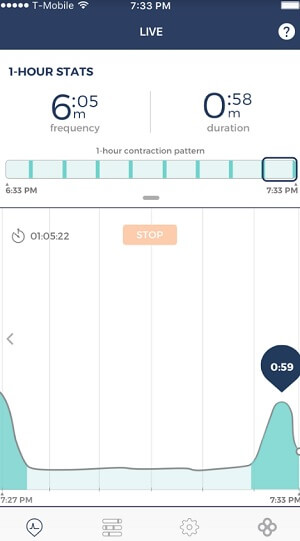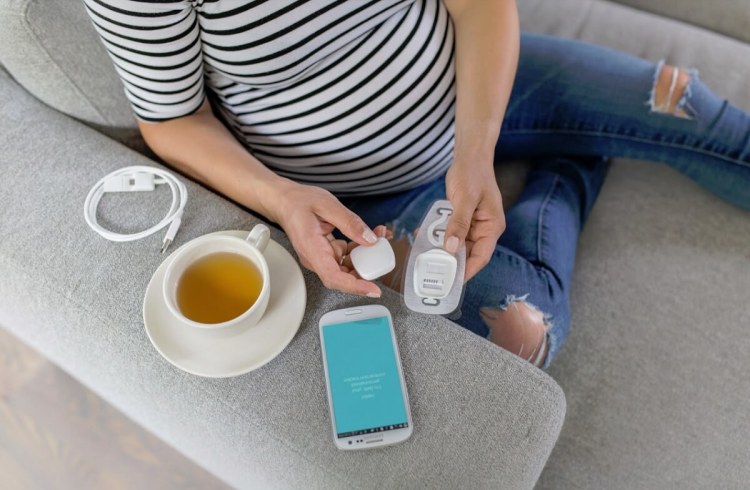Bloomlife has created a wearable for pregnant women, enabling them to track changes in their bodies as well as contraction patterns during labor.

Above: Bloomlife measures contractions.
The device is available for preorders, Bloomlife announced at CES 2017, the big tech trade show in Las Vegas this week. The wearable is another way to deliver real-time information to people just they really need it most.
Expectant mothers want better information about their bodies during pregnancy for peace of mind and to make more confident decisions. Going beyond “contraction timer” apps that essentially operate as a stopwatch, Bloomlife automatically measures, counts, and times contractions (Braxton Hicks and labor) in real time by safely and passively picking up electrical signals from the uterine muscle.
Normally, a woman would have to be in a hospital to get this kind of feedback. From the comfort of home, Bloomlife provides a clinically validated second opinion to help expectant moms understand what contractions feel like. It allows them to easily track changes in contraction patterns throughout the third trimester to see how their body is preparing for labor. Bloomlife also makes it easier for a woman to share her pregnancy journey with partners and family, while facilitating data-driven conversations with care teams.
“I learned first-hand that every pregnancy is unique and each baby is on their own timeline,” said Sarah Bylsma, a Bloomlife beta user, in a statement. “With my third pregnancy, I started having preterm contractions at 25 weeks and was in the hospital three times.”
She added, “Hospital visits are expensive and disruptive, and despite being a neonatal nurse practitioner and [my] experiences with two previous pregnancies, the contractions were so frequent that I was having trouble deciding when I needed to go in. With Bloomlife, I was able to see whether what I was feeling was actually contractions or just uterine irritability, and was able to quickly determine the regularity and frequency. In a time of high stress and anxiety, Bloomlife gave me peace of mind.”
Bloomlife wants to empower moms with accurate actionable information on their pregnancy. It also hopes to impact prenatal health on a global scale. The company is committed to using its technology to accelerate long overdue advancements in prenatal health research, with a particular focus on preterm birth.
In support of its mission to improve birth outcomes, and in partnership with the Bloomlife community of moms, the company intends to crowdsource the largest and most comprehensive data set on maternal and fetal health parameters to identify biomarkers for pregnancy complications.
“Despite one in eight women delivering preterm, the underlying causes and triggers of preterm birth are poorly understood,” says Eric Dy, cofounder and CEO of San Francisco-based Bloomlife, in a statement. “Traditional approaches to clinical research are fraught with red tape when it comes to pregnancy. Naturally, anything that is perceived to risk a mother and her baby remain strictly off limits.”

Above: Bloomlife gives expectant mothers peace of mind.
He added, “Bloomlife has developed a better way to move beyond the clunky inconvenient 40-year-old technology that is used in hospitals today that requires strapping women to beds. In doing so, we improve the overall usability, and, since we don’t use ultrasound, allow for longitudinal recordings necessary to collect the missing data to advance our understanding of pregnancy and complications such as preterm birth.”
Over nine months in beta, Bloomlife collected feedback from hundreds of users that were part of the early access program and four clinical studies. The commercial product can now be preordered to help today’s expectant parents.
Users can visualize each contraction as it occurs and learn how it corresponds to the sensations they’re feeling. Bloomlife also calculates the frequency and duration of contractions so women can more easily communicate with their birth team.
A smartphone-connected sensor is offered for both iOS and Android. Bloomlife is priced as a hardware rental at $150 for one month, $250 for two months, and $300 for three months. Orders received today are expected to be shipped within the first quarter.
Founded in 2014, Bloomlife has a team with over a decade of experience developing advanced wearables for consumer and medical markets. The company has strategic partnerships with Stanford researchers and University of California at San Francisco’s Preterm Birth Initiative and was winner of Richard Branson’s 2016 Extreme Tech Challenge.
Bloomlife has 13 employees, and it raised $4 million in seed funding in a round led by Marc Benioff and Act One Ventures.


